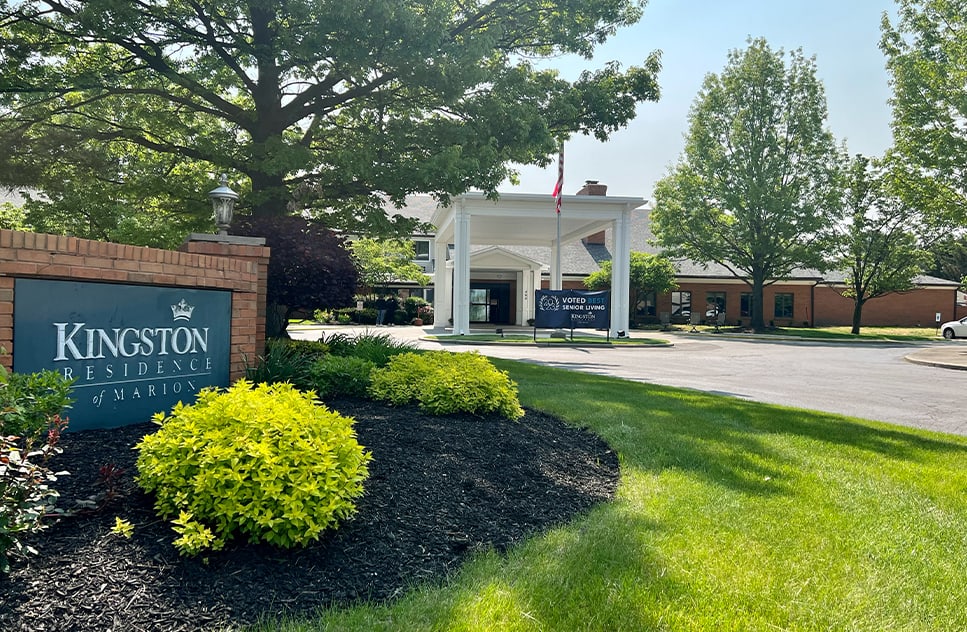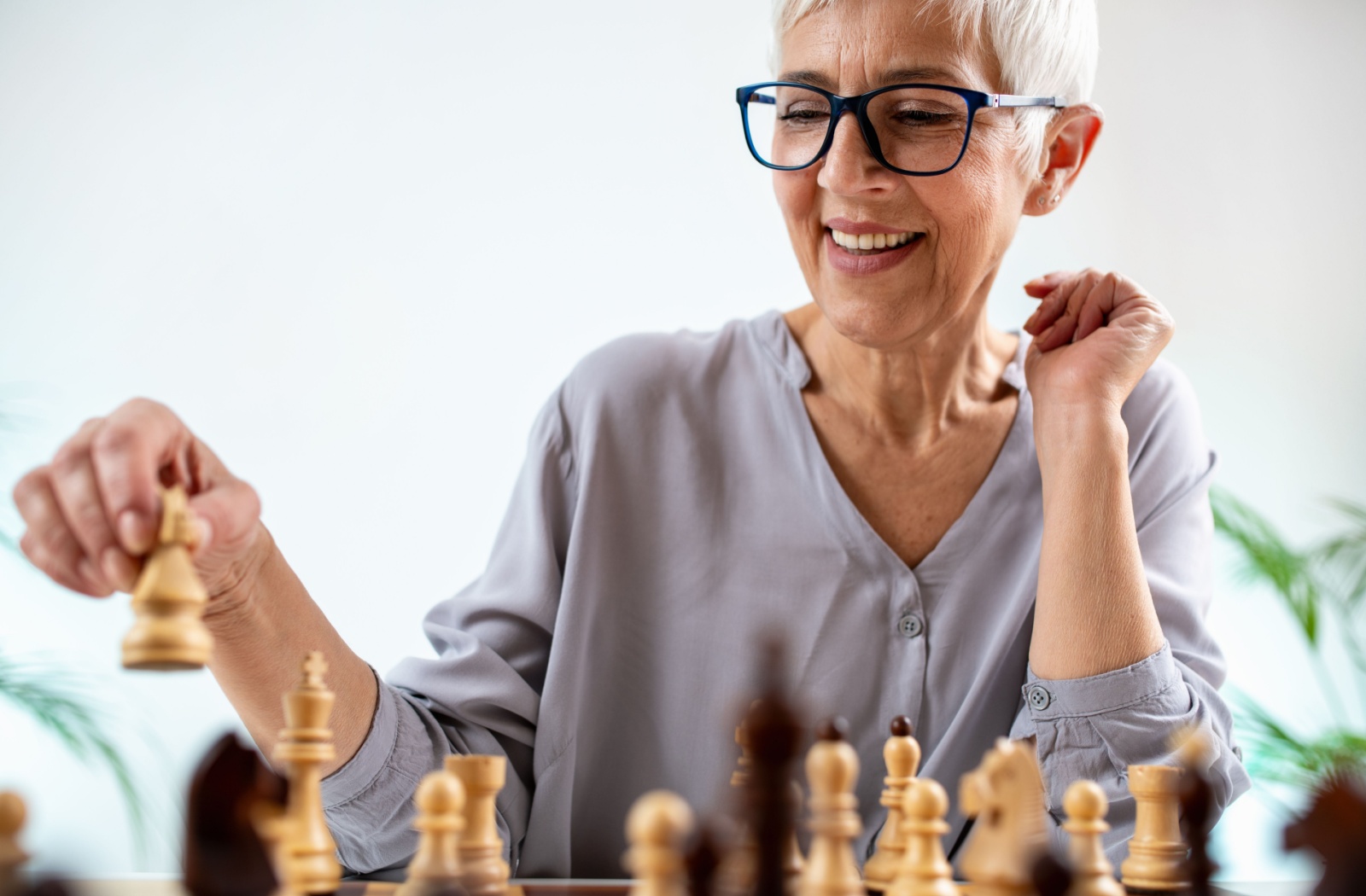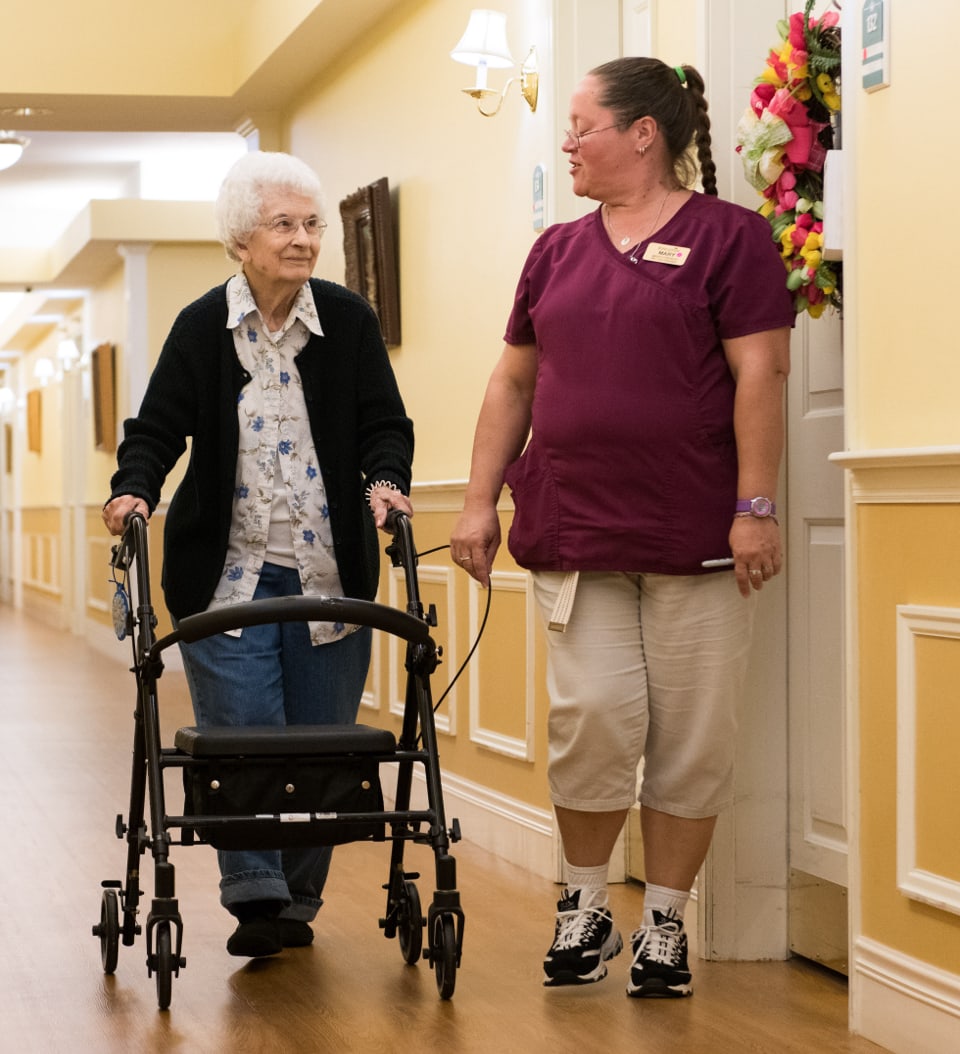Staying mentally active is an essential part of healthy aging. When a loved one experiences cognitive changes, finding meaningful ways to keep their mind engaged can bring joy, connection, and a sense of purpose.
These moments don’t need to be complex, either. They can be as simple as trying something new.
6 excellent cognitive activities for seniors include:
- Strengthening memory and mood with games
- Strengthening social connections through interaction
- Building confidence with chores and simple projects
- Improving coordination and focus through exercise
- Boosting creativity and self-expression through art
- Sparking joy and memory with music
Tips for Helping an Older Loved One Strengthen Their Brain
Supporting brain health is easier than most people think. Regular mental stimulation through enjoyable, personalized activities can keep your loved one’s mind active and engaged.
Strengthening Memory & Mood With Games
Games are a fun, interactive way to spark conversation, encourage problem-solving, and boost memory. They can also create shared moments that strengthen your relationships.
Some engaging options include:
- Word puzzles and crosswords that encourage recall
- Trivia games focused on favorite topics, themes, or eras
- Card games like rummy or bridge that mix memory with strategy
- Digital games or apps that suit their abilities and interests
Choose games they genuinely enjoy so the activity feels like leisure, not work.
Strengthening Social Connections Through Interaction
Social interaction plays a powerful role in mental stimulation. Spending time with friends, family, or community members encourages conversation, laughter, and emotional support.
Group activities like book clubs, coffee meetups, or shared hobbies provide enjoyable opportunities to connect. Even simple visits or phone calls can nurture a sense of belonging. These moments of connection can strengthen relationships and provide emotional support.
Building Confidence with Chores
Involving your loved one in chores can help them feel capable and connected to daily life. Folding laundry, setting the table, or organizing a drawer can support senior independence while keeping routines mentally engaging.
These activities encourage a sense of contribution, provide light physical movement, and help maintain fine motor skills. These activities can also give older adults a sense of accomplishment, reinforcing their ability to contribute to their home and surroundings.
By involving your loved one in these tasks, you can help them maintain their confidence and autonomy.
Improving Coordination & Focus Through Exercise
Physical activity isn’t just helpful for the body. It plays a key role in supporting mental sharpness and overall focus. It helps to encourage your loved one to try working more gentle exercise into their routine.
Some popular senior-friendly exercises for a stronger mind include:
- Yoga to enhance flexibility and mindfulness
- Tai chi to improve balance and focus
- Walking to promote cardiovascular health and mental clarity
- Dancing to encourage coordination, circulation, and creativity
- Chair exercises for those with limited mobility or balance
However, don’t force your loved ones to make any significant changes right away. Visiting a healthcare professional for a checkup lets you determine safe exercises to benefit your body and mind.
Boosting Creativity & Self-Expression Through Art
Art therapy offers a positive outlet for self-expression while stimulating different areas of the brain. Creative activities can help relieve stress, improve focus, and create lasting keepsakes.
Some ideal arts and craft activities for seniors include:
- Painting or drawing with simple, easy-to-hold tools
- Collage-making from magazines or printed photos
- Clay modeling for tactile engagement
- Adult coloring books for relaxation and mindfulness
- Scrapbooking to preserve memories
Focus on the process rather than the result. The goal isn’t perfect—it’s giving your loved one the opportunity to enjoy the act of creating without pressure.

Sparking Joy & Memory with Music
Music therapy can evoke powerful reminiscence, improve mood, and reduce stress. Listening to familiar tunes or singing along to favorite songs can connect your loved one to meaningful moments from their past.
Playing instruments—whether it’s a piano, guitar, or even small percussion—can also encourage engagement and improve memory.
Creating a personalized playlist or organizing a small sing-along can bring comfort and joy while supporting cognitive health.
Making Activities Part of Daily Life
You or your loved one can work these diverse activities into your loved one’s everyday life. It’s all about making small, conscious shifts to their routine to encourage them to keep working on their favorite activities.
Try these quick tips to make cognitive activities an easy part of their day:
- Tailor activities to their personal interests and comfort level
- Start small and build up gradually, focusing on consistency
- Add activities to established routines for familiarity
- Invite others to join for added motivation and enjoyment
- Stay flexible and adjust as needs change
These are simple steps, but they can make a significant difference.
Helping Your Loved One Stay Mentally Engaged
Supporting your loved one’s cognitive health doesn’t have to be complicated. Choose activities they genuinely enjoy, and offer support without taking over their independence. And when possible, join in! Everyone can enjoy the benefits of cognitive activities at any age.
It’s a simple approach, and here at Kingston Residence of Marion, we know how much it helps to stay mentally active.
In our community, we’re always happy to help families create meaningful moments and support their loved ones’ well-being. Schedule a visit with our team today to learn more!






